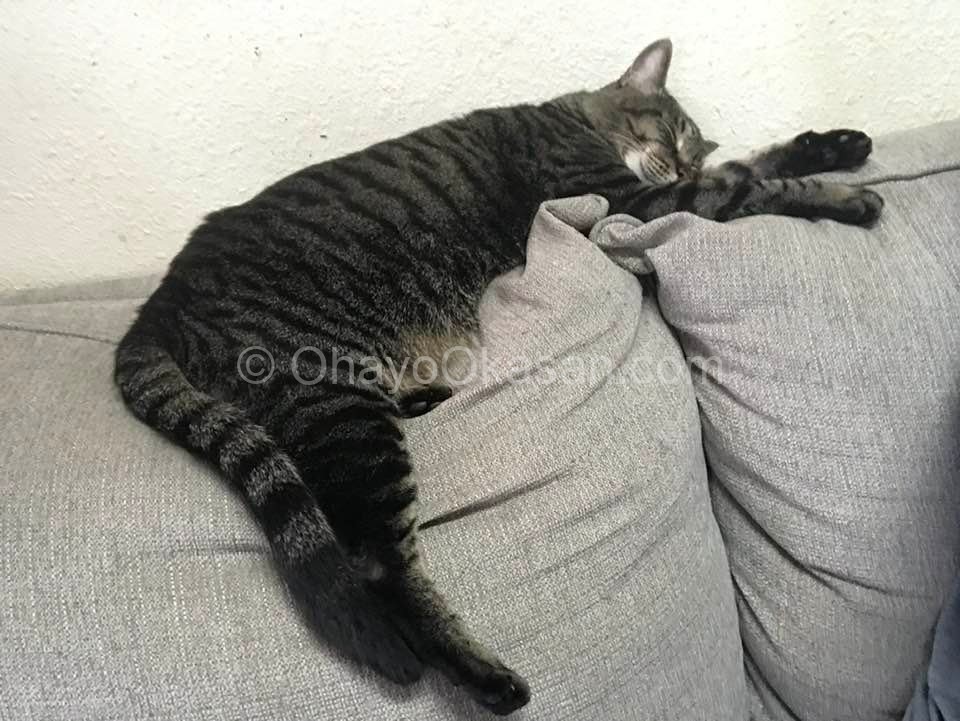I suffered from horrible insomnia for years. It would take me hours to be able to shut down my thoughts, or as I would say it “shut off my brain” to be able to fall asleep. My thoughts would go all over the place, problems throughout the day, random things that just suddenly would spring forward, problems that didn’t even exist but could very possibly do so! I tried sleep medications but would sleep walk or have weird dreams, and I tried “resetting” my sleep by attempting to pull “all nighters” to exhaust myself in hopes that I’d fall asleep easily the next night and be okay going forward. I tried just having a routine very night to see if that would help on top of it all.

Cat’s make falling asleep look so easy!
Sadly, at the end of the day while certain things helped a bit, nothing did as much as I wanted. So I finally figured what else could I possibly do but try something to get my thoughts focused on something else. Something not “no, stop it, I just need to sleep….. why can’t I sleep…..?”
From reading up on it, meditation has been shown to have the ability to help people relax and fall asleep. Meditation is a powerful tool that can help you relax and fall asleep faster, and help you reduce stress and anxiety.
Here’s how you can incorporate meditation into your bedtime routine to improve your sleep:
- Find a dark, quiet and comfortable place where you can lie down.
- Establish a relaxing atmosphere by dimming/turning off the lights, play soft music, ambient sounds, or white noise, and use essential oils if you’d like.
- Close your eyes and take a few deep breaths, focusing on the sensation of the air moving in and out of your body. You can also Take deep breaths, hold them for a few seconds, and then release slowly. Repeat this several times.
- Try counting backwards from 100 to zero. Focus on each number and let your mind slow down.
- Practice progressive muscle relaxation, which involves tensing and then relaxing different muscle groups in your body. This can help you release any pent-up tension and stress.
- Repeat positive affirmations to yourself, such as “I am relaxed and at peace” or “I release all stress and tension”. I personally do “breathe in calming energy” as I inhale and “breathe out stress/pain” as a way to calm myself down to sleep.
- If your mind starts to wander, gently bring your focus back to your breath.
- Try a guided meditation, where a voice leads you through a visualization exercise, or repeat a mantra or affirmations to yourself.
By using meditation to relax your mind and body, you can help yourself fall asleep faster and enjoy a better night’s sleep. Give it a try and see how it works for you. When I first started, I used a guided meditation I found on YouTube, I used it for a couple of months before it was really helpful, as getting into the habit is really key. After that time I would fall asleep faster and faster listening to it. Sadly, the channel that had it took away that video and a couple of others I really enjoyed using.
In the end, I do deep breathing, and positive affirmations as I do so as a way to calm down my body and mind so I can fall asleep. Sure, if I’ve had a particularly bad day, and emotions are high, it might not work as fast as it usually does. But anymore I can thankfully fall asleep within 15-20 minutes, instead of 3-5hours of misery knowing I’m exhausted but unable to get to sleep.


Your journey with overcoming insomnia through meditation is inspiring. Your detailed steps to incorporate meditation into your bedtime routine provide valuable insights. It’s wonderful to hear how this practice has brought you relief and improved sleep. Your experience will surely resonate with others seeking a restful night’s sleep.
Thanks for your sharing!